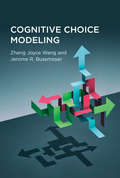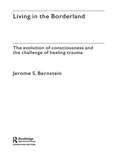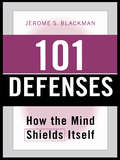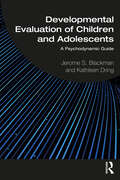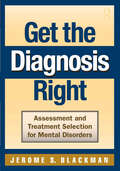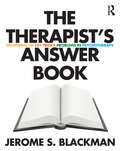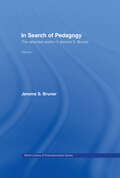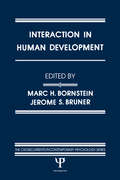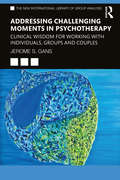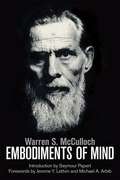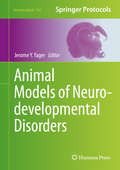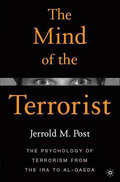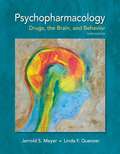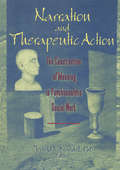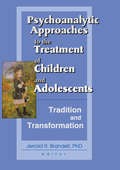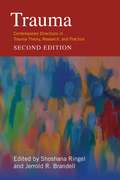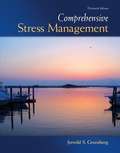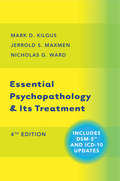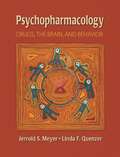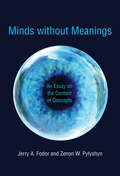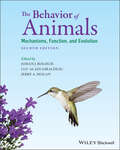- Table View
- List View
Cognitive Choice Modeling
by Jerome R. Busemeyer Zheng Joyce WangThe emerging interdisciplinary field of cognitive choice models integrates theory and recent research findings from both decision process and choice behavior.Cognitive decision processes provide the interface between the environment and brain, enabling choice behavior, and the basic cognitive mechanisms underlying decision processes are fundamental to all fields of human activity. Yet cognitive processes and choice processes are often studied separately, whether by decision theorists, consumer researchers, or social scientists. In Cognitive Choice Modeling, Zheng Joyce Wang and Jerome R. Busemeyer introduce a new cognitive modeling approach to the study of human choice behavior. Integrating recent research findings from both cognitive science and choice behavior, they lay the groundwork for the emerging interdisciplinary field of cognitive choice modeling.
Quantum Models of Cognition and Decision
by Jerome R. Busemeyer Peter D. BruzaMuch of our understanding of human thinking is based on probabilistic models. This innovative book by Jerome R. Busemeyer and Peter D. Bruza argues that, actually, the underlying mathematical structures from quantum theory provide a much better account of human thinking than traditional models. They introduce the foundations for modelling probabilistic-dynamic systems using two aspects of quantum theory. The first, 'contextuality', is a way to understand interference effects found with inferences and decisions under conditions of uncertainty. The second, 'quantum entanglement', allows cognitive phenomena to be modeled in non-reductionist ways. Employing these principles drawn from quantum theory allows us to view human cognition and decision in a totally new light. Introducing the basic principles in an easy-to-follow way, this book does not assume a physics background or a quantum brain and comes complete with a tutorial and fully worked-out applications in important areas of cognition and decision.
Living in the Borderland: The Evolution of Consciousness and the Challenge of Healing Trauma
by Jerome S. BernsteinLiving in the Borderland addresses the evolution of Western consciousness and describes the emergence of the ‘Borderland,' a spectrum of reality that is beyond the rational yet is palpable to an increasing number of individuals. Building on Jungian theory, Jerome Bernstein argues that a greater openness to transrational reality experienced by Borderland personalities allows new possibilities for understanding and healing confounding clinical and developmental enigmas. There are many people whose experiences of reality is outside the mainstream of Western culture; often they see themselves as abnormal because they have no articulated frame of reference for their experience. The concept of the Borderland personality explains much of their experience. In three sections, this book examines the psychological and clinical implications of the evolution of consciousness and looks at how the new Borderland consciousness bridges the mind-body divide. Subjects covered include: · Genesis: Evolution of the Western Ego · Transrational Data in a Western Clinical Context: Synchronicity · Trauma and Borderland Transcendence · Environmental Illness Complex · Integration of Navajo and Western healing approaches for Borderland Personalities. Living in the Borderland challenges the standard clinical model, which views normality as an absence of pathology and which equates normality with the rational. Jerome S. Bernstein describes how psychotherapy itself often contributes to the alienation of Borderland personalities by misperceiving the difference between the pathological and the sacred. The case studies included illustrate the potential this has for causing serious psychic and emotional damage to the patient. This challenge to the orthodoxies and complacencies of Western medicine’s concept of pathology will interest Jungian Analysts, Psychotherapists, Psychiatrists and other physicians, as well as educators of children. Jerome S. Bernstein is a Jungian Analyst in private practice in Santa Fe, New Mexico
101 Defenses: How the Mind Shields Itself
by Jerome S. BlackmanDefenses are mental operations that restore or maintain psychic equilibrium when people feel that they cannot manage emotions that stem from conflict; they remove components of unpleasant emotions from conscious awareness. For example, using sex, food, or hostility to relieve tension - that's a defense - catalogued here as entry number 68: Impulsivity. Screaming at someone can be a defense. Playing golf can be a defense. So can saving money. Or at least all of these activities may involve defenses. In this book, Blackman catalogs 101 defenses - the most ever compiled - with descriptions practical for use in everyday assessment and treatment of psychopathology. He explains how to detect and interpret a defense and offers supportive therapy techniques. The many practical tips interspersed throughout this text make it an excellent reference tool for students and experienced clinicians, while the user-friendly features allow all readers to experience how psychological defenses operate in everyday life.
Developmental Evaluation of Children and Adolescents: A Psychodynamic Guide
by Kathleen Dring Jerome S. BlackmanDevelopmental Evaluation of Children and Adolescents: A Psychodynamic Guide offers an in-depth, multiperspective analysis of any delays, regressions, or aberrations in a child’s developmental trajectory. Blackman and Dring help the evaluator understand the child’s internal conflicts, as well as the family/environmental context in which the child functions. Chapters move longitudinally through the developmental stages. In each chapter, there are several "key questions" for evaluators to ask parents, fulfilling the need for clinicians to quickly assess children, followed by a longer question sheet and explanation of various answers to the questions for a more thorough assessment. Each chapter also provides a discussion of the child’s phase and a table listing the questions and answers for quick reference. Finally, brief case studies demonstrate how the developmental history and the initial session with the child should be integrated. This book serves as an essential clinical guide to the developmental evaluation of children and will be suitable for all therapists working with children.
Get the Diagnosis Right: Assessment and Treatment Selection for Mental Disorders
by Jerome S. BlackmanDr. Jerome Blackman, author of 101 Defenses: How the Mind Shields Itself, has once again crafted an extraordinarily user-friendly book that demonstrates to all readers, from trainees to advanced analysts, the process of diagnosing mental disturbance. Get the Diagnosis Right provides a systematic method for accurately determining whether a person suffering with mental problems needs medication, supportive/cognitive, dynamic, and/or psychoanalytic treatment. Amalgamating the most useful ideas from general psychiatry, cognitive psychology, and modern psychoanalytic theory, Dr. Blackman guides readers who prescribe treatment for mental disturbances. The book also serves as a check for those who are considering what type of mental health professional they should be consulting.After reading this book, you will no longer have to guess whether a depressed patient should obtain medication, supportive therapy, insight therapy, or some mixture of the three; or question how to conduct an initial interview and assessment. Written in language that is clear but not simplistic, this book goes far beyond other diagnostic manuals.
The Therapist's Answer Book: Solutions to 101 Tricky Problems in Psychotherapy
by Jerome S. BlackmanTherapists inevitably feel more gratified in their work when their cases have better treatment outcomes. This book is designed to help them achieve that by providing practical solutions to problems that arise in psychotherapy, such as: Do depressed people need an antidepressant, or psychotherapy alone? How do you handle people who want to be your “friend,” who touch you, who won’t leave your office, or who break boundaries? How do you prevent people from quitting treatment prematurely? Suppose you don’t like the person who consults you? What if people you treat with CBT don’t do their homework? When do you explain defense mechanisms, and when do you use supportive approaches? Award-winning professor, Jerome Blackman, answers these and many other tricky problems for psychotherapists. Dr. Blackman punctuates his lively text with tips and snippets of various theories that apply to psychotherapy. He shares his advice and illustrates his successes and failures in diagnosis, treatment, and supervision. He highlights fundamental, fascinating, and perplexing problems he has encountered over decades of practicing and supervising therapy.
In Search of Pedagogy Volume I: The Selected Works of Jerome Bruner, 1957-1978
by Jerome S. BrunerJerome Bruner is one of the best-known and most influential psychologists of the twentieth century. His theories about cognitive development dominate psychology around the world today, but it is in the field of education where his influence has been especially felt. In this two volume set, Bruner has selected and assembled his most important writings about education. Volume I spans the twenty years from 1957 to 1978 and Volume II covers 1979 to 2006. Volume I starts with a specially written introduction by Bruner, in which he gives an overview of the 1957-1978 years and contextualises his selection of papers. The articles and chapters then reveal the thinking, the concepts and the empirical research of that time that have made Bruner one of the most respected and cited educational authorities of our time.
Interaction in Human Development (Crosscurrents in Contemporary Psychology Series)
by Jerome S. Bruner Marc H. BornsteinInteraction in Human Development unites theoretical essays and empirical accounts bearing directly on the nature of interactions as a principal factor and organizing feature in human mental and social development. The papers discuss all areas of interaction including genetic, environmental, life-span, interpersonal, and cultural. Ideal as a text for students and as a reference for professionals in personality, developmental, educational, and environmental psychology, psychotherapy, behavioral medicine, and language.
Addressing Challenging Moments in Psychotherapy: Clinical Wisdom for Working with Individuals, Groups and Couples (The New International Library of Group Analysis)
by Jerome S. GansThis practical and helpful volume details how clinicians can work through various common challenges in individual, couple, or group psychotherapy. Chapters draw upon clinical wisdom gleaned from the author’s 48 years as a practicing psychiatrist to address topics such as using countertransference for therapeutic purposes; resistance, especially when it needs to be the focus of the therapy; and a prioritization of exploration over explanation. Along with theory and clinical observations, Dr.Gans offers a series of "Clinical Pearls," pithy comments that highlight different interventions to a wide range of clinical challenges. These include patient hostility, the abrupt and unilateral termination of therapy, the therapist’s loss of compassionate neutrality when treating a couple, and many more. Many of the "Clinical Pearls" prioritize working in the here-and-now. In addition to offering advice and strategies for therapists, the book also addresses concerns like the matter of fees in private practice and the virtue of moral courage on the part of the therapist. Written with clarity, heart, and an abundance of clinical wisdom, Addressing Challenging Moments in Psychotherapy is essential reading for all clinicians, teachers, and supervisors of psychotherapy.
Embodiments of Mind
by Michael A. Arbib Jerome Y. Lettvin Seymour A. Papert Warren S. MccullochWarren S. McCulloch was an original thinker, in many respects far ahead of his time. McCulloch, who was a psychiatrist, a philosopher, a teacher, a mathematician, and a poet, termed his work "experimental epistemology." He said, "There is one answer, only one, toward which I've groped for thirty years: to find out how brains work." Embodiments of Mind, first published more than fifty years ago, teems with intriguing concepts about the mind/brain that are highly relevant to recent developments in neuroscience and neural networks. It includes two classic papers coauthored with Walter Pitts, one of which applies Boolean algebra to neurons considered as gates, and the other of which shows the kind of nervous circuitry that could be used in perceiving universals. These first models are part of the basis of artificial intelligence.Chapters range from "What Is a Number, that a Man May Know It, and a Man, that He May Know a Number," and "Why the Mind Is in the Head," to "What the Frog's Eye Tells the Frog's Brain" (with Jerome Lettvin, Humberto Maturana, and Walter Pitts), "Machines that Think and Want," and "A Logical Calculus of the Ideas Immanent in Nervous Activity" (with Walter Pitts). Embodiments of Mind concludes with a selection of McCulloch's poems and sonnets. This reissued edition offers a new foreword and a biographical essay by McCulloch's one-time research assistant, the neuroscientist and computer scientist Michael Arbib.
Animal Models of Neurodevelopmental Disorders (Neuromethods #104)
by Jerome Y. YagerProviding a spectrum of models that is reflective of the various species that can be utilized in experimentation on disorders across a broad range of developmental disabilities, this volume collects expert contributions involved in investigation of the causes, outcomes, treatment, and prevention. Animal Models of Neurodevelopmental Disorders explores models of perinatal hypoxia-ischemia/cerebral palsy and stroke, autism spectrum disorder, fetal alcohol syndrome, as well as mental retardation. Written in the popular Neuromethods series style, chapters include the kind of detail and key advice from the specialists needed to get successful results in your own laboratory. Practical and authoritative, Animal Models of Neurodevelopmental Disorders serves to introduce and entice those interested in better understanding and treating these disorders to the vital animal model world of investigation.
Narcissism and Politics
by Jerrold M. PostIn this age of narcissism, the proliferation of politicians with significant narcissistic personality features is dramatic. Driven by dreams of glory, they seem to find the spotlight that the arena of politics provides irresistible. This book analyzes narcissism and politics and systematically explores the psychology of narcissism - the entitlement, the grandiosity and arrogance overlying insecurity, the sensitivity to criticism, and the hunger for acclaim - illustrating different narcissistic personality features through a spectrum of international and national politicians. It addresses the power of charismatic leader–follower relationships, as well as the impact of age and illness on leaders driven by dreams of glory.
The Mind of the Terrorist: The Psychology of Terrorism from the IRA to al-Qaeda
by Jerrold M. PostIn contrast to the widely held assumption that terrorists as crazed fanatics, Jerrold Post demonstrates they are psychologically "normal" and that "hatred has been bred in the bone". He reveals the powerful motivations that drive these ordinary people to such extraordinary evil by exploring the different types of terrorists, from national-separatists like the Irish Republican Army to social revolutionary terrorists like the Shining Path, as well as religious extremists like al-Qaeda and Aum Shinrikyo. In The Mind of the Terrorist, Post uses his expertise to explain how the terrorist mind works and how this information can help us to combat terrorism more effectively.
The Modular Architecture of Grammar
by Jerrold M. SadockModular grammar postulates several autonomous generative systems interacting with one another as opposed to the prevailing theory of transformational grammar where there is a single generative component - the syntax - from which other representations are derived. In this book Jerrold Sadock develops his influential theory of grammar, formalizing several generative modules that independently characterize the levels of syntax, semantics, role structure, morphology and linear order, as well as an interface system that connects them. Multi-modular grammar provides simpler, more intuitive analyses of grammatical phenomena and allows for greater empirical coverage than prevailing styles of grammar. The book illustrates this with a wide-ranging analysis of English grammatical phenomena, including raising, control, passive, inversion, do-support, auxiliary verbs and ellipsis. The modules are simple enough to be cast as phrase structure grammars and are presented in sufficient detail to make descriptions of grammatical phenomena more explicit than the approximate accounts offered in other studies.
Psychopharmacology: Drugs, The Brain, And Behavior
by Jerrold Meyer Linda QuenzerUnique in its breadth of coverage ranging from historical accounts of drug use to clinical and preclinical behavioral studies, Psychopharmacology is appropriate for undergraduates studying the relationships between the behavioral effects of psychoactive drugs and their mechanisms of action.
Narration and Therapeutic Action: The Construction of Meaning in Psychoanalytic Social Work
by Jerrold R BrandellNarration and Therapeutic Action raises challenging questions about the limitations of science and of scientific inquiry for the practice of social work. In doing so, this innovative book calls upon clinical social workers, psychologists, and psychoanalysts to examine some of the most fundamental assumptions about the clinical process and what is “therapeutic” about it. Written by social work clinicians and theorists, the book explores the construction of meaning within the dual framework of psychoanalysis and clinical social work.Readers of Narration and Therapeutic Action will find the way in which clinical illustrations are used to articulate theoretical ideas especially useful. You will find chapters ranging from the highly abstract and theoretical to those that consider very specific dimensions of clinical process. As contributors examine various aspects of narrative theory and its relationship to psychoanalysis and clinical social work, they highlight such themes as: important theoretical contributions of psychoanalytic authors (including Roy Schafer, Donald Spence, and the French psychoanalyst Jacque Lacan) to the study of narratives how to use various frameworks, such as self psychology and multigenerational family systems theory, as a structure for analysis of clients’narratives narratives and their “fit” in psychoanalytic developmental theories the evolution of specific narratives in the context of ongoing psychoanalytically-oriented treatment the narration of traumatic experiences in dynamic psychotherapyClinical social workers, psychoanalysts, and psychologists will find Narration and Therapeutic Action filled with answers to important questions about the very nature of what is therapeutic in the psychoanalytic process and why; whether existing theory can be used with modification as a guide to the “unpacking” of the text; and if there are specific psychoanalytic theories of development better-suited to the meaning-making that occurs in the crucible of the psychoanalytic dialogue. Narration and Therapeutic Action is ideal as a guide and reference for practitioners and students of clinical social work, psychoanalysis, and clinical psychology as well as for instructors of clinical theory and practice. Readers will find abundant evidence of consensus and conflict, disparity and complementarity, and resonance and dissonance in the contributors’ diverse viewpoints. While this provides readers with support for their preexisting theoretical and clinical assumptions, it also offers a broadened perspective on other theories.
Psychoanalytic Approaches to the Treatment of Children and Adolescents: Tradition and Transformation
by Jerrold R BrandellIn the nearly one hundred years that have elapsed since Freud’s publication of his pioneering work with “Little Hans,” psychoanalysis has transformed not only our clinical work with children, but has immeasurably enriched our understanding of normal child and adolescent development as well as developmental deviations and derailments. We have gradually come to understand childhood and adolescence as a complex tapestry of developmental themes, conflicts, and crises; sometimes discontinuous or discrete, at other times, harmonious and integrated, yet always occurring within a transactional matrix of environmental influences and internal experience.In this transdisciplinary anthology, eight authors explore the changing terrain of child and adolescent psychoanalysis and psychoanalytic therapy. The contributions, which reflect theoretical and clinical heterogeneity, are both innovative and varied, and range from the highly abstract and theoretical to those that consider very specific dimensions of clinical process. Collectively, they make a compelling case for the continued relevance of psychoanalytic ideas in the treatment of children and adolescents. With insightful contributions by expert psychoanalysts, clinical social workers, and clinical psychologists, Psychoanalytic Approaches to the Treatment of Children and Adolescents: Tradition and Transformation is essential reading for child and adolescent therapists. Psychoanalytic Approaches to the Treatment of Children and Adolescents will increase your knowledge of: the function of play in normal development--and within the treatment relationship psychoanalytic theories and research investigations linking early object loss to depression the nature of adolescent depression the theoretical and clinical dimensions of a two-systems approach to understanding psychopathology and the clinical process the dynamic meaning and clinical management of drug and alcohol abuse, promiscuity, eating disorders, violence, and other self-destructive behaviors the complexities of treating children with neuropsychological deficits
Trauma: Contemporary Directions in Trauma Theory, Research, and Practice
by Shoshana Ringel Jerrold R. BrandellAn expanded and revised edition of the first social work text to focus specifically on the theoretical and clinical issues associated with trauma, this comprehensive anthology incorporates the latest research in trauma theory and clinical applications. It presents key developments in the conceptualization of trauma and covers a wide range of clinical treatments.Trauma features coverage of emerging therapeutic modalities and clinical themes, focusing on the experiences of historically disenfranchised, marginalized, oppressed, and vulnerable groups. Clinical chapters discuss populations and themes including cultural and historical trauma among Native Americans, the impact of bullying on children and adolescents, the use of art therapy with traumatically bereaved children, historical and present-day trauma experiences of incarcerated African American women, and the effects of trauma treatment on the therapist. Other chapters examine trauma-related interventions derived from diverse theoretical frameworks, such as cognitive-behavioral theory, attachment theory, mindfulness theory, and psychoanalytic theory.
Comprehensive Stress Management (Thirteenth Edition)
by Jerrold S. GreenbergComprehensive Stress Management empowers students to learn what stress is, evaluate their level of stress, and apply to their own lives the tools and skills to manage that stress. The book examines a variety of topics relevant to college students such as intrapersonal and interpersonal stressors, physiological reactions to stress, spirituality and stress, occupational stress, and family stress. Lab Assessments at the conclusion of each chapter help students relate what they have learned to their personal lives by encouraging them to identify specific attitudes, behaviors, and coping skills as well as target areas for improvement. The 13th edition incorporates many changes and updates while still retaining the content and features valued by instructors and students over the previous editions.
Essential Psychopathology & Its Treatment
by Mark D. Kilgus Jerrold S. Maxmen Nicholas G. WardLong considered a leading text on the assessment, diagnosis, and treatmentof psychiatric disorders, this latest revision includes cutting-edge updates inneuroscience, psychopharmacology, and genetics. Geared to resident students inpsychiatry and related disciplines, it makes practical, readable sense of the field.
Psychopharmacology: Drugs, the Brain, and Behavior
by Jerrold S. Meyer Linda F. QuenzerRecent advances in molecular pharmacology and brain imaging have revolutionized our understanding of how psychoactive drugs work. Now, from the authors of Principles of Neuropsychopharmacology, comes a new undergraduate textbook integrating these developments. The first section of the book provides extensive foundation materials, including the basic principles of pharmacology, neurophysiology and neuroanatomy, synaptic transmission, and methods in psychopharmacology. The second section describes key features of major neurotransmitter systems, including the catecholamines, serotonin, acetylcholine, glutamate and GABA. The third and fourth sections discuss theories and mechanisms of drug addiction and psychopathology. All major substances of abuse as well as drugs used to treat mental illness are covered.
Minds without Meanings: An Essay on the Content of Concepts (The\mit Press Ser.)
by Jerry A. Fodor Zenon W. PylyshynTwo prominent thinkers argue for the possibility of a theory of concepts that takes reference to be concepts' sole semantic property.In cognitive science, conceptual content is frequently understood as the “meaning” of a mental representation. This position raises largely empirical questions about what concepts are, what form they take in mental processes, and how they connect to the world they are about. In Minds without Meaning, Jerry Fodor and Zenon Pylyshyn review some of the proposals put forward to answer these questions and find that none of them is remotely defensible.Fodor and Pylyshyn determine that all of these proposals share a commitment to a two-factor theory of conceptual content, which holds that the content of a concept consists of its sense together with its reference. Fodor and Pylyshyn argue instead that there is no conclusive case against the possibility of a theory of concepts that takes reference as their sole semantic property. Such a theory, if correct, would provide for the naturalistic account of content that cognitive science lacks—and badly needs. Fodor and Pylyshyn offer a sketch of how this theory might be developed into an account of perceptual reference that is broadly compatible with empirical findings and with the view that the mental processes effecting perceptual reference are largely preconceptual, modular, and encapsulated.
Creative Intimacy: How to Break the Patterns That Poison Your Relationships
by Jerry A. Greenwald"The pressures of modern living and the complexities of transient relationships prevent us from forming deeply intimate bonds with one another. Real, lasting intimacy, though difficult to attain, is a precious gift that we all desire and deserve. Now, in this breakthrough book, Dr. Jerry, famed therapist and best-selling author of Be the Person You Were Meant to Be, reveals a foolproof method structured to help everyone attain total lifetime contentment. Stressing that no one is too unattractive, too failure-prone or too old to create a fulfilling intimate relationship, Dr. Greenwald does believe that many people are too timid, too insecure or just afraid to take the first positive steps. These steps, and the simple ones that follow, are clearly outlined in Creative Intimacy. Digging deep into Gestalt therapy, the book demonstrates how to develop a healthy 'yes' attitude and still know when to say 'no'; how to avoid detouring your life into blind alleys that create self-diminishing, self-defeating patterns; how to abandon the 'happily ever after' myth and deal with reality; how to employ the 'no' process as a weapon against emotional fragmentation and toxic intrusion; and how to build psychic-space and gain the rewards that belong to us all--an open, flexible, adaptable and optimistic nature and an intimate relationship that is a prime source of stability, security and emotional nourishment. Creative Intimacy is waiting for you. Gain new techniques, new enthusiams and a new ability to reach out and find your intimate other. Begin learning how to achieve creative intimacy today. The past does not dictate the future, patterns can be broken, and true intimate relationships can be a reality for everyone." On an academic level, this book provides students and professionals with constructive psycho-therapeutic techniques to use with their clients.
The Behavior of Animals: Mechanisms, Function, and Evolution
by Luc-Alain Giraldeau Jerry A. Hogan Johan J. BolhuisThe Behavior of Animals An updated view of animal behavior studies, featuring global experts The Behavior of Animals, Second Edition provides a broad overview of the current state of animal behavior studies with contributions from international experts. This edition includes new chapters on hormones and behavior, individuality, and human evolution. All chapters have been thoroughly revised and updated, and are supported by color illustrations, informative callouts, and accessible presentation of technical information. Provides an introduction to the study of animal behavior Looks at an extensive scope of topics- from perception, motivation and emotion, biological rhythms, and animal learning to animal cognition, communication, mate choice, and individuality. Explores the evolution of animal behavior including a critical evaluation of the assumption that human beings can be studied as if they were any other animal species. Students will benefit from an updated textbook in which a variety of contributors provide their expertise and global perspective in specialized areas
